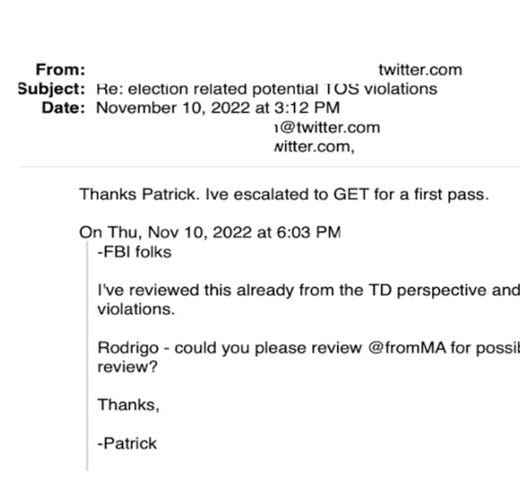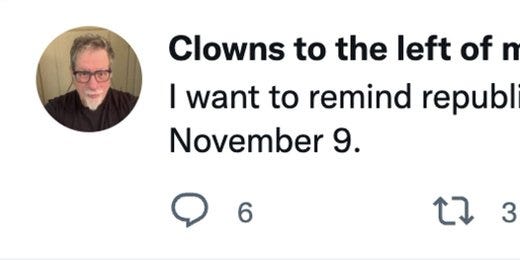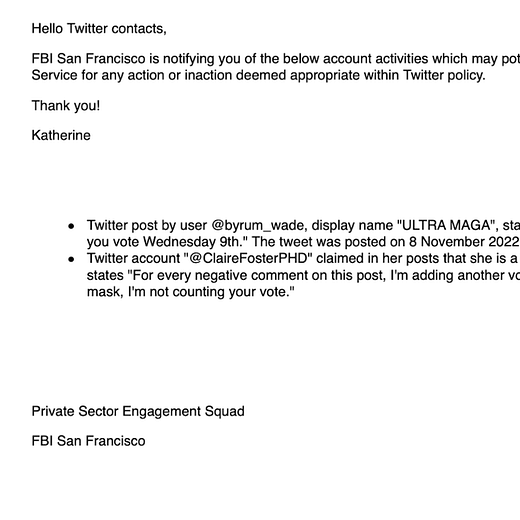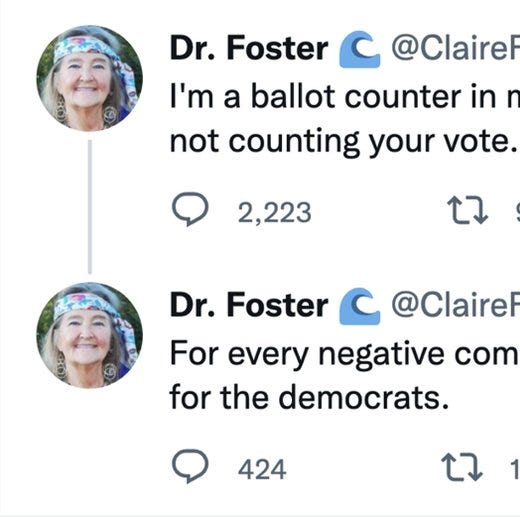The United States in History's Rearview Mirror
It's time to start planning what comes after the United States
“We may not get what we want. We may not get what we need. Just so we don’t get what we deserve.”
—True Colors, 1991
Following Donald Trump’s 2016 win, the FBI manufactured the Russian Collusion Hoax as a pretext to regulate the press and private speech regarding elections, effectively abolishing the First Amendment. The FBI expanded the scope of its surveillance and censorship operation to control speech related to public health.
The FBI’s anti-speech division grew to more than 80 full-time agents who operated outside of Congressional oversight and above the reach of the Judicial Branch.
Effectively, the FBI under Chris Wray conducted a coup, abolishing the Constitution, and appointing a puppet chief executive. In the process, the FBI orchestrated the Russian Collusion Hoax sham investigation, impeached the president under false testimony of a mutineer, and launched numerous false flag operations to discredit, arrest, and torture supporters of the former president.
Some of my friends shudder when I say the United States government is the enemy of the people. Those friends are wrong. I say that in charity and in hopes that today’s shocking Twitter Files dump will help them recognize that the Deep State has upended the Constitution and the American experiment is over. It’s over.
Here are the choice learnings from today’s report by Matt Taibbi beginning with the end: the Deep State is real, dangerous, and completely in control of the US government.
The FBI created this task force to prevent the people from electing their choice of president following Donald Trump’s defeat of Hillary Clinton in 2016. The FBI literally committed itself to blocking the will of the people.
Former US intel officers recognize that the Constitution has fallen, that the FBI, DHS, CIA, and DoD are now part of a despotic occupation force foreign to our Constitution and opposed to civil rights:
The FBI ordered Twitter to suspend or suppress the voices of even ordinary citizens with fewer than 1,000 followers:
The FBI’s suppression of the First Amendment was nonstop and was channeled through Elvis Chan in the San Francisco field office:
Conservatives who urged citizens to vote were flagged, suspended, and put on the FBI’s watch list:
That’s enough. You can click on any of the above tweets to access the entire thread of today’s Twitter Files.
The purpose of this post is not inform you of the new information—you probably already know. Instead, this post is to help you realize that defense is no longer enough. It’s time to start preparing for what will follow. See, the American Century ended at midnight on December 31, 1999. The petrodollar, which made the final 25 percent of that century possible, is on its way down the tubes as I’ve been warning for many months. The idea of democracy is pretty much dead, as we now know that a cabal of Deep State actors use elections to give the ignorant the illusion of representative government. Public and private debt in the United States cannot be paid off in a millennium.
What’s about to happen—in the next one to ten years—is akin to what Strauss and Howe described in The Fourth Turning as:
With or without war, American society will be transformed into something different. The emergent society may be something better, a nation that sustains its Framers’ visions with a robust new pride. Or it may be something unspeakably worse.
The Fourth Turning will be a time of glory or ruin. The Crisis resolution will establish the political, economic, and social institutions with which our children and heirs will live for decades thereafter. Fresh from the press of history, the new civic order will rigidify around all the new authorities, rules, boundaries, treaties, empires, and alliances. The Crisis climax will recede into the public memory—a heart-pounding memory to all who will recall it personally, a pivot point for those born in its aftermath, the stuff of myth and legend for later generations. And, for better or worse, everyone who survives will be left to live with the outcome.1
The United States that began operations on March 4, 1789, no longer exists. The institutions built by our fathers and grandfathers, funded with their tax dollars, defended on battlefields and oceans by their blood, tears, toil, and sweat, have fallen to enemy hands—on our watch. The working-age generations—late Boomers, Gen X, Millennials, and Gen Z—failed to answer the call. Merrily we marched along to fight in the Cold War, Panama, Kuwait, Iraq, and Afghanistan, but the real enemy was in Foggy Bottoms and Arlington, VA. We could not keep the republic.
These generations owe a debt of sacrifice to those that founded and built this country. For, though the government they established has been lost, the nation they sired survives. America is distinct from the United States the way the soul is distinct from the body. The body might die, but the soul never will. The United States may be pariah among governments, but America is still the shining city on a hill.
America was once 13 states bound together only by a common ideal brilliantly reduced to words by Thomas Jefferson. Successive generations bound those former colonies together with ever-tightening cords: the Constitution, new federal departments and agencies, a growing standing army, federal police agencies, regulations, Constitutional amendments to permit direct taxation of wages and the popular election of Senators, activist jurists who interpreted the Constitution in a light most favorable to despotism.
At some point, a difference in degree becomes a difference in kind, and a free people weighed down by a network of petty bureaucrats and onerous regulations becomes a nation of slaves. We are free today in name only, and even saying the name “freedom” will now bring an FBI agent to your digital door with surveillance tools to gather the information needed to ruin your life and quiet your “violative” tongue.
Before you lament the horrors of living in this diseased and rotting epoch of history, remember that we have been here before. A decade-long economic depression was followed by the greatest war the world has ever seen, and the American Century was born, or, at least, recognized. And one generation played the key role in that crisis. It was a generation of slackers that grew up in the Roaring Twenties, violating the Volstead Act and writing dangerous, irreverent books and screenplays. It was the Lost Generation of F. Scott Fitzgerald, George S. Patton, and Ike Eisenhower, a generation of “nomads” who anchored themselves in reality. The current iteration of Nomads is Generation X, and we reached our leadership years just in time.
Howe and Strauss put it this way:
This “no second act” generation lent America the grit to survive dark global emergencies and, in the end, to triumph over them. In the Great Depression, the Lost were hard-hit but refused to ask for public favors. In World War II, they manned the draft boards, handed out the ration coupons, mapped the invasions, and dispatched the bomber fleets. They gave the orders that killed thousands but saved millions. From “blood and guts” generals to “give ‘em hell” presidents, the Lost knew how to prevail over long odds and harsh criticism.2
If you were born between 1962 and 1984, my friends, history has called on you to forge the new American nation to be built on the ruins of the United States. Again, from The Fourth Turning, we learn about our Nomad ancestors of the 20s, 30s, and 40s:
“I’ve glimpsed our future,” warns a high school valedictorian in the film Say Anything, “and all I can say is—go back.” The message to her classmates is understandable, because Nomad generations—what Christian Slater refers to as “a long list of dead, famous wild people”—have always been the ones who lose ground in wealth, education, security, longevity, and other measures of progress. Yet they have also been the generations who lay at the fulcrum between triumph and tragedy, the ones who hoist their society through the darkest days of Crisis.3
Somewhere else in The Fourth Turning, the authors quote a line from a 90s movie, True Colors: “We may not get what we want. We may not get what we need. Just so we don’t get what we deserve.”
Well, it looks like we are getting what we deserve. And it looks like it’s up to us to lay that fulcrum between glory and ruin. And it looks like the time to start is now.
I’ll leave you with the challenge I present myself every day: if the US government closed shop tomorrow, what should we do?
The list of possible answers is miles long. We could beg to be annexed by a neighboring country. We could ask the UK to take us back into the realm. We could declare each state a sovereign nation. We could hold a new convention to draft a constitution for the 50 states—or for as many states as wish be rejoined into some sort of union.
The actual list of possibilities would fill volumes even written as pithy bullets. But I’ll stop there since my list ended with my favorite—a new country comprising the states that saw value in the original Constitution, or even the Articles of Confederation. An opportunity to rewrite our animating document upon the ancient wisdom of the Founders informed and improved by the hard-earned wisdom of the succeeding 233 years. The wisdom to limit that new government’s size, linking its budget and revenue to a fraction of GDP, prohibiting a national police force, and limiting terms of office for all members of Congress and even government employees. We’ve learned a lot in the last 200 years, not the least of which is that the framers failed to anticipate such a godless, evil society as America managed to produce in the last 50 years. Perhaps the freedom of religion adopted in the First Amendment should be less absolute, and our new nation promotes Christian morals a bit more explicitly. ( I would support a clause requiring all public oaths to be to the God of the Torah and the Gospels under penalty of perjury.)
The realization that the United States is no longer gives me the kind of sadness one feels about nostalgic memories, not the kind of grief associated with the loss of a child. The United States was an empire in the history of man. An exceptional empire for a time, no doubt, but nothing more. Empires come and go. Our old empire is receding like the back of a highway sign seen in the rearview mirror. It’s up to us to found a new nation on its ideals but with no pretense or ambition towards imperialism. Let our new nation be satisfied with conquering the challenges of getting through life with our souls spotless.
As a Gen Xer, I can say that life has given me what I wanted and needed. The trade off is . . . I’m also going to get what I deserve. As frightening as that realization might be, it’s comforting to know that our battle is just a repeat of many fought by “a long list of dead, famous wild people” who came before us. We are Americans.
Strauss, William; Howe, Neil. The Fourth Turning (pp. 278-279). Crown. Kindle Edition.
Ibid. (pp. 287-288)
Ibid. (p. 288)















A peaceful divorce would be the best to hope for.